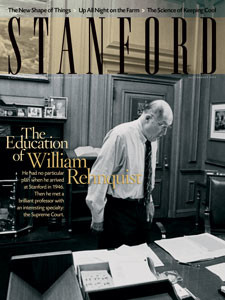And Camera Makes Three (Stanford)
“What a perfect day,” my husband announced as Saturday morning dawned gray and gloomy.
That afternoon our friend was to be married in Memorial Church, and while I worried that it might rain on her wedding, my husband was delighted by the cloudy sky, which he calls “the mother of all Soft Boxes.” Married to a shutterbug, I know what this means: the bride and groom may not be thrilled by the overcast, but what’s a little haze when it means there’ll be no harsh shadows in the photos?
As the ceremony approached, we walked from the Oval to the church, passing enough bridal photo shoots to warrant a group discount. To my hubby, the weather was still unbeatable, and he couldn’t wait to snap pictures of our 4-year-old in her pink flower-girl dress. Still, his jaunty gait was remarkable, considering he carried a camera bag weighing more than the average ring bearer. In its 76 compartments, he kept various lenses, filters and other accessories. All this gear could pay down a summer house (and probably did for the owner of B&H Photo), so to throw off would-be thieves it’s all stowed in an ordinary-looking backpack. No one would suspect its owner is a photographer—unless, of course, they’re tipped off by the tripod, too tall to fit inside.
Part of me likes my husband’s hobby, which he took up ostensibly to capture memories of our children. I’m glad he found a pursuit that flawlessly meshes his interest in art with his knack for all things technical. Still, I’m not thrilled. Just because I like cute pictures of our kids, do I really have to hear about f-stops and flash brackets?
Apparently, yes. In an earlier era, an amateur photographer might have spent hours sequestered in a makeshift darkroom. But gone are the days of husbands locking themselves in closets. Today’s all-digital photographer has no fear of accidental exposure, and my spouse relishes sharing with me every stage of a print in the making. When he’s done snapping the pictures, he retreats only so far as the computer next to mine. While I write, he interrupts every few minutes, asking me to assess his latest polishing of the pixels. “What do you think of it now?” he asks. “I recalibrated my monitor, burned in the edges and isolated all the radioactive isotopes.” Or something like that.
When I ask why he keeps asking my opinion, he tells me he trusts my judgment. Or, as he puts it, “You seem to know what the average person likes.”
He never tires of honing his craft. For example, he’s in Week 4 of Floral Photography, an online class that teaches, among other things, how to clamp down a delicate daisy so that it stays perfectly still while facing the camera. There’s homework each week, compelling my darling to bring home flowers with uncharacteristic frequency. I’d be delighted if I didn’t know that every rose, tulip and hyacinth had been selected only with an eye to how it would look under a macro lens.
When I express dismay that the flowers aren’t for me, my love tells me that they’ll all be mine as soon as he’s done with his assignment. “They’ll still be fresh,” he assures me brightly. Which only makes me want to open the aperture and head for it with the nearest watering can.
It wasn’t always like this. Eight years ago—well before he’d been bitten by the camera bug—I remember arriving at the Quad to have our own wedding portraits taken. That day, he had eyes only for me, and not for the official photographer’s medium-format Hasselblad.
My friend’s nuptials, like mine, came off beautifully—all tulle, calla lilies and heartfelt vows. But let’s face it: the perfection of a wedding, with its months of planning, lasts about as long as a clutch of orchids. That’s why everyone brings cameras.
But if a wedding is about cut flowers, then marriage itself is more like, well, a vegetable garden. So here’s my wish for newlyweds: in addition to getting lovely albums and frames for your wedding photos, may you also receive a lifetime supply of Miracle-Gro.
COPYRIGHT 2005 © Marina Krakovsky. All Rights Reserved.
This article written by Marina Krakovsky appeared in the July/August 2005 issue of Stanford magazine.








